PSY101: Adulthood Development and Cognition Homework
VerifiedAdded on 2023/01/10
|7
|1081
|73
Homework Assignment
AI Summary
This psychology assignment explores various aspects of adulthood, including physical and cognitive changes, relationship dynamics, and identity development. The student answers questions about key concepts such as Erikson's stages of psychosocial development and Marcia's identity development theory, analyzing how these theories apply to young adults. The assignment also addresses topics like the impact of parenting styles on identity, factors that strengthen marriage, and the leading causes of death in young adulthood. Furthermore, the document includes a discussion on the influence of culture on defining adulthood and provides insights into cognitive changes from early to middle adulthood. Overall, the assignment demonstrates an understanding of core psychological principles related to the stages of adulthood.
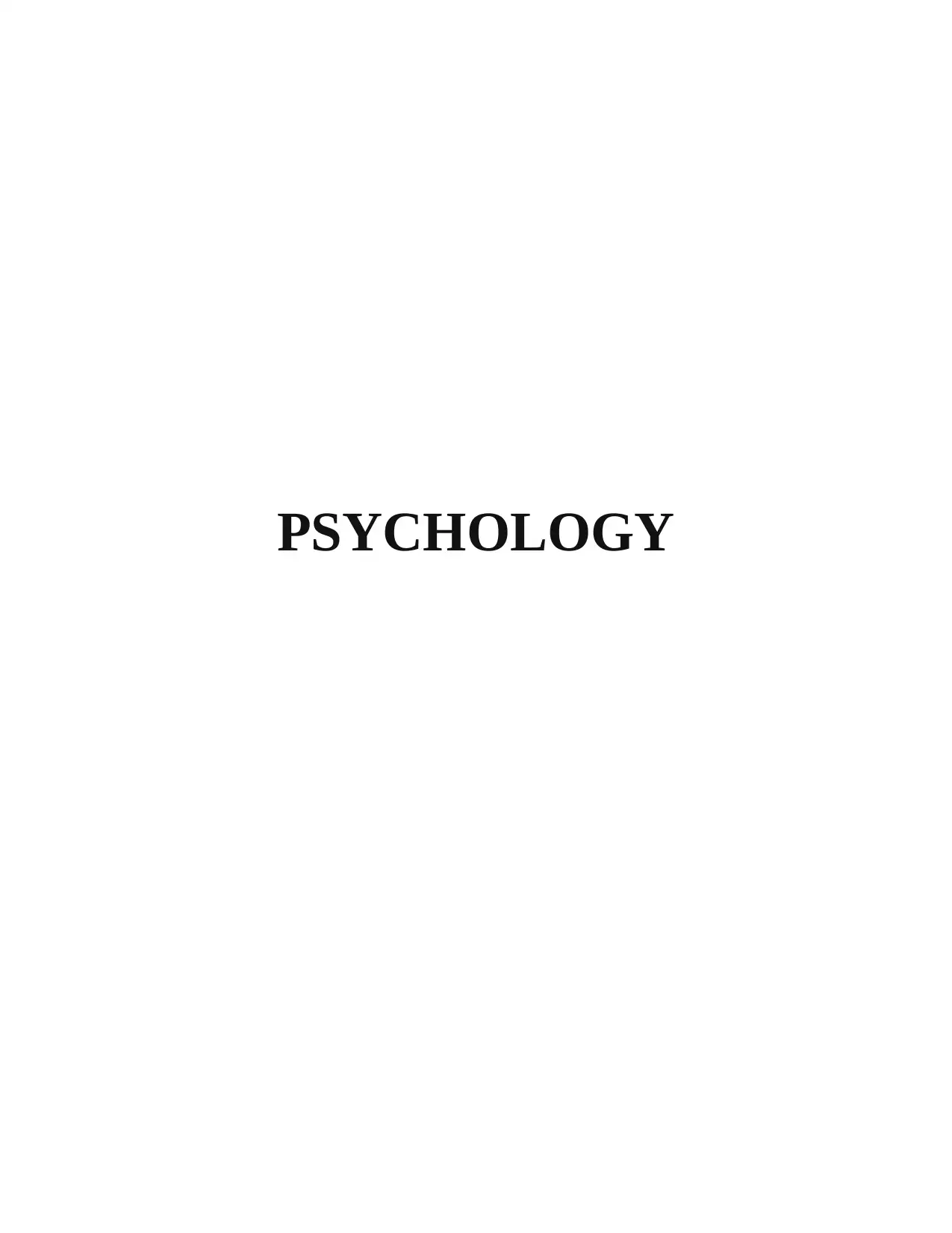
PSYCHOLOGY
Paraphrase This Document
Need a fresh take? Get an instant paraphrase of this document with our AI Paraphraser
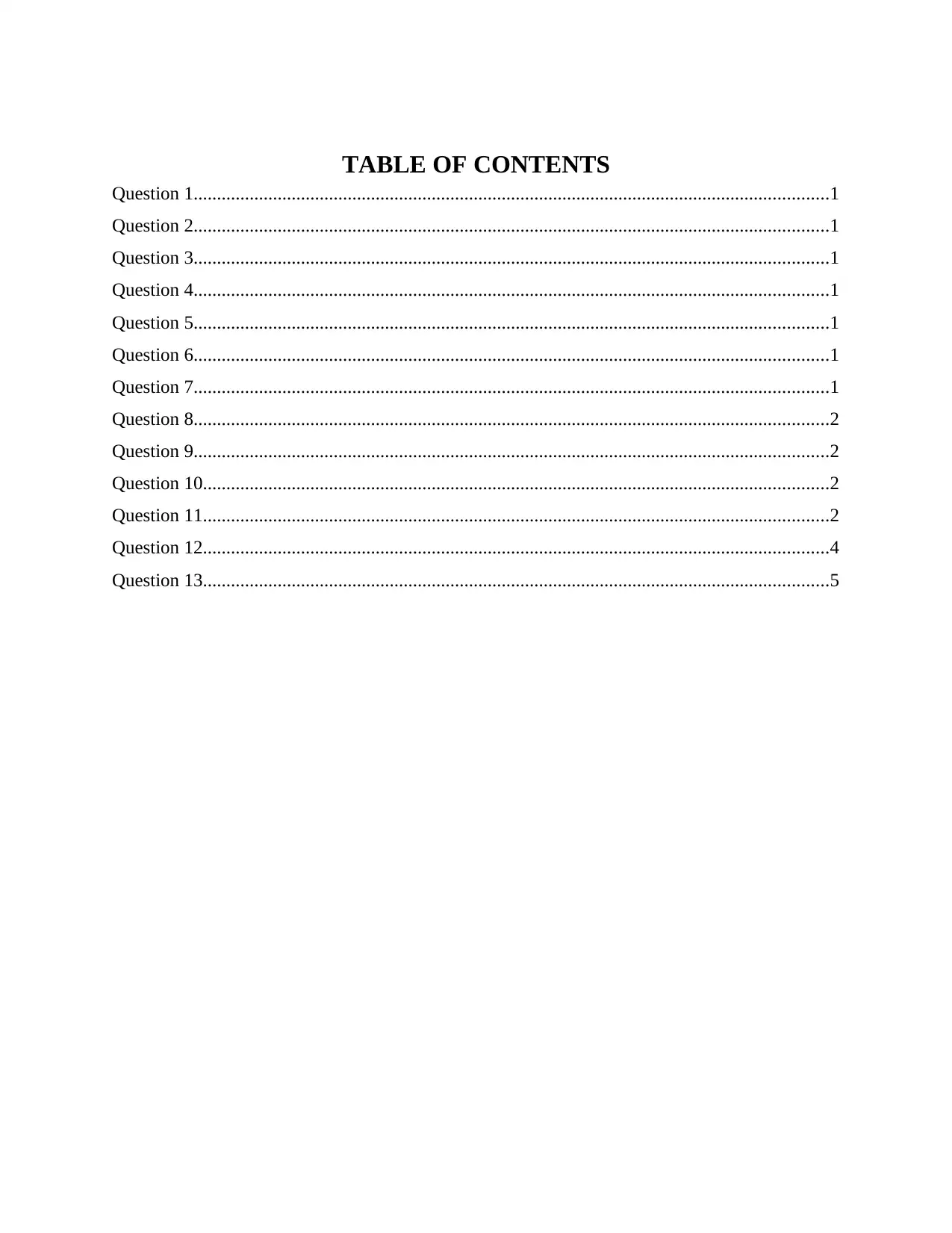
TABLE OF CONTENTS
Question 1........................................................................................................................................1
Question 2........................................................................................................................................1
Question 3........................................................................................................................................1
Question 4........................................................................................................................................1
Question 5........................................................................................................................................1
Question 6........................................................................................................................................1
Question 7........................................................................................................................................1
Question 8........................................................................................................................................2
Question 9........................................................................................................................................2
Question 10......................................................................................................................................2
Question 11......................................................................................................................................2
Question 12......................................................................................................................................4
Question 13......................................................................................................................................5
Question 1........................................................................................................................................1
Question 2........................................................................................................................................1
Question 3........................................................................................................................................1
Question 4........................................................................................................................................1
Question 5........................................................................................................................................1
Question 6........................................................................................................................................1
Question 7........................................................................................................................................1
Question 8........................................................................................................................................2
Question 9........................................................................................................................................2
Question 10......................................................................................................................................2
Question 11......................................................................................................................................2
Question 12......................................................................................................................................4
Question 13......................................................................................................................................5
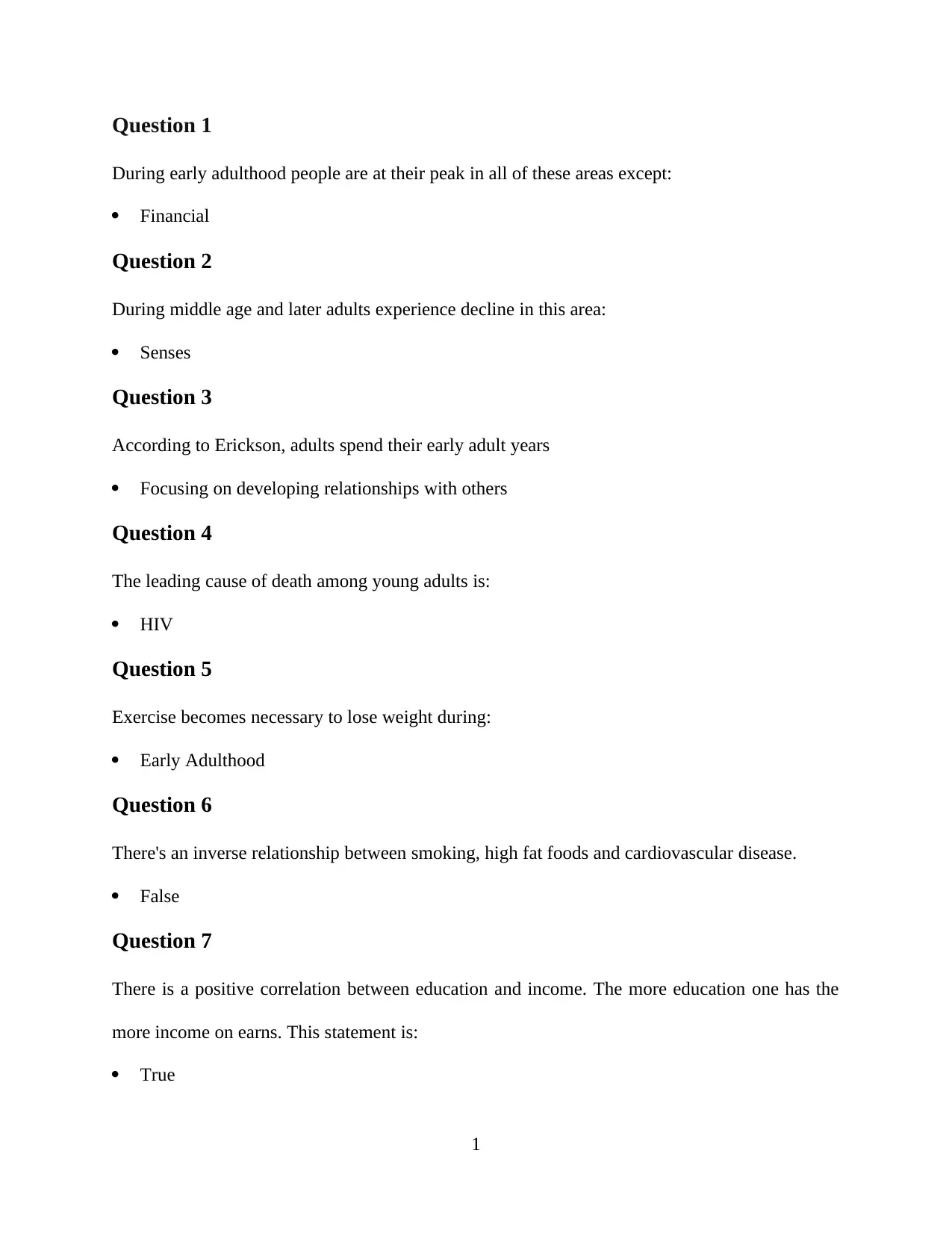
Question 1
During early adulthood people are at their peak in all of these areas except:
Financial
Question 2
During middle age and later adults experience decline in this area:
Senses
Question 3
According to Erickson, adults spend their early adult years
Focusing on developing relationships with others
Question 4
The leading cause of death among young adults is:
HIV
Question 5
Exercise becomes necessary to lose weight during:
Early Adulthood
Question 6
There's an inverse relationship between smoking, high fat foods and cardiovascular disease.
False
Question 7
There is a positive correlation between education and income. The more education one has the
more income on earns. This statement is:
True
1
During early adulthood people are at their peak in all of these areas except:
Financial
Question 2
During middle age and later adults experience decline in this area:
Senses
Question 3
According to Erickson, adults spend their early adult years
Focusing on developing relationships with others
Question 4
The leading cause of death among young adults is:
HIV
Question 5
Exercise becomes necessary to lose weight during:
Early Adulthood
Question 6
There's an inverse relationship between smoking, high fat foods and cardiovascular disease.
False
Question 7
There is a positive correlation between education and income. The more education one has the
more income on earns. This statement is:
True
1
⊘ This is a preview!⊘
Do you want full access?
Subscribe today to unlock all pages.

Trusted by 1+ million students worldwide
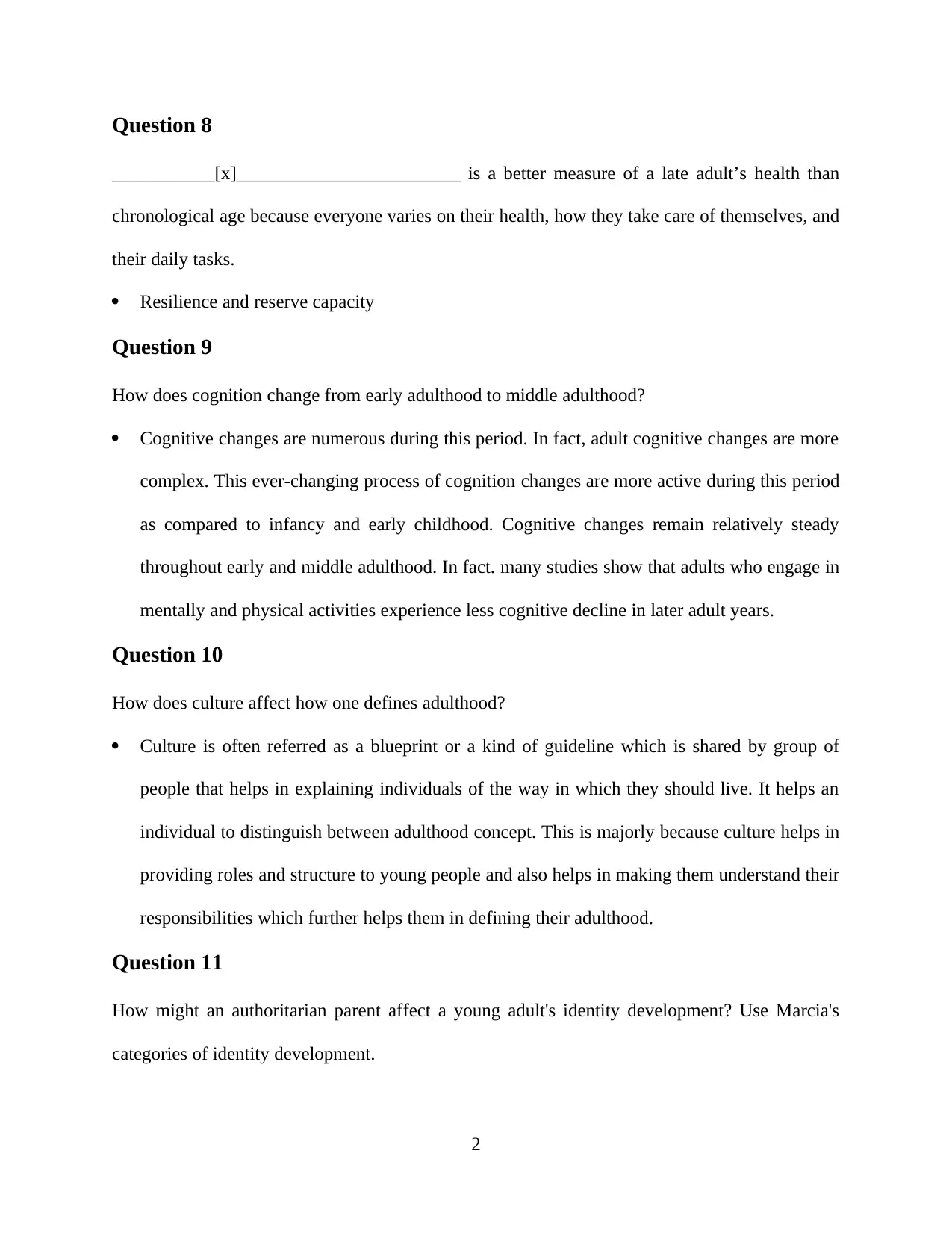
Question 8
___________[x]________________________ is a better measure of a late adult’s health than
chronological age because everyone varies on their health, how they take care of themselves, and
their daily tasks.
Resilience and reserve capacity
Question 9
How does cognition change from early adulthood to middle adulthood?
Cognitive changes are numerous during this period. In fact, adult cognitive changes are more
complex. This ever-changing process of cognition changes are more active during this period
as compared to infancy and early childhood. Cognitive changes remain relatively steady
throughout early and middle adulthood. In fact. many studies show that adults who engage in
mentally and physical activities experience less cognitive decline in later adult years.
Question 10
How does culture affect how one defines adulthood?
Culture is often referred as a blueprint or a kind of guideline which is shared by group of
people that helps in explaining individuals of the way in which they should live. It helps an
individual to distinguish between adulthood concept. This is majorly because culture helps in
providing roles and structure to young people and also helps in making them understand their
responsibilities which further helps them in defining their adulthood.
Question 11
How might an authoritarian parent affect a young adult's identity development? Use Marcia's
categories of identity development.
2
___________[x]________________________ is a better measure of a late adult’s health than
chronological age because everyone varies on their health, how they take care of themselves, and
their daily tasks.
Resilience and reserve capacity
Question 9
How does cognition change from early adulthood to middle adulthood?
Cognitive changes are numerous during this period. In fact, adult cognitive changes are more
complex. This ever-changing process of cognition changes are more active during this period
as compared to infancy and early childhood. Cognitive changes remain relatively steady
throughout early and middle adulthood. In fact. many studies show that adults who engage in
mentally and physical activities experience less cognitive decline in later adult years.
Question 10
How does culture affect how one defines adulthood?
Culture is often referred as a blueprint or a kind of guideline which is shared by group of
people that helps in explaining individuals of the way in which they should live. It helps an
individual to distinguish between adulthood concept. This is majorly because culture helps in
providing roles and structure to young people and also helps in making them understand their
responsibilities which further helps them in defining their adulthood.
Question 11
How might an authoritarian parent affect a young adult's identity development? Use Marcia's
categories of identity development.
2
Paraphrase This Document
Need a fresh take? Get an instant paraphrase of this document with our AI Paraphraser
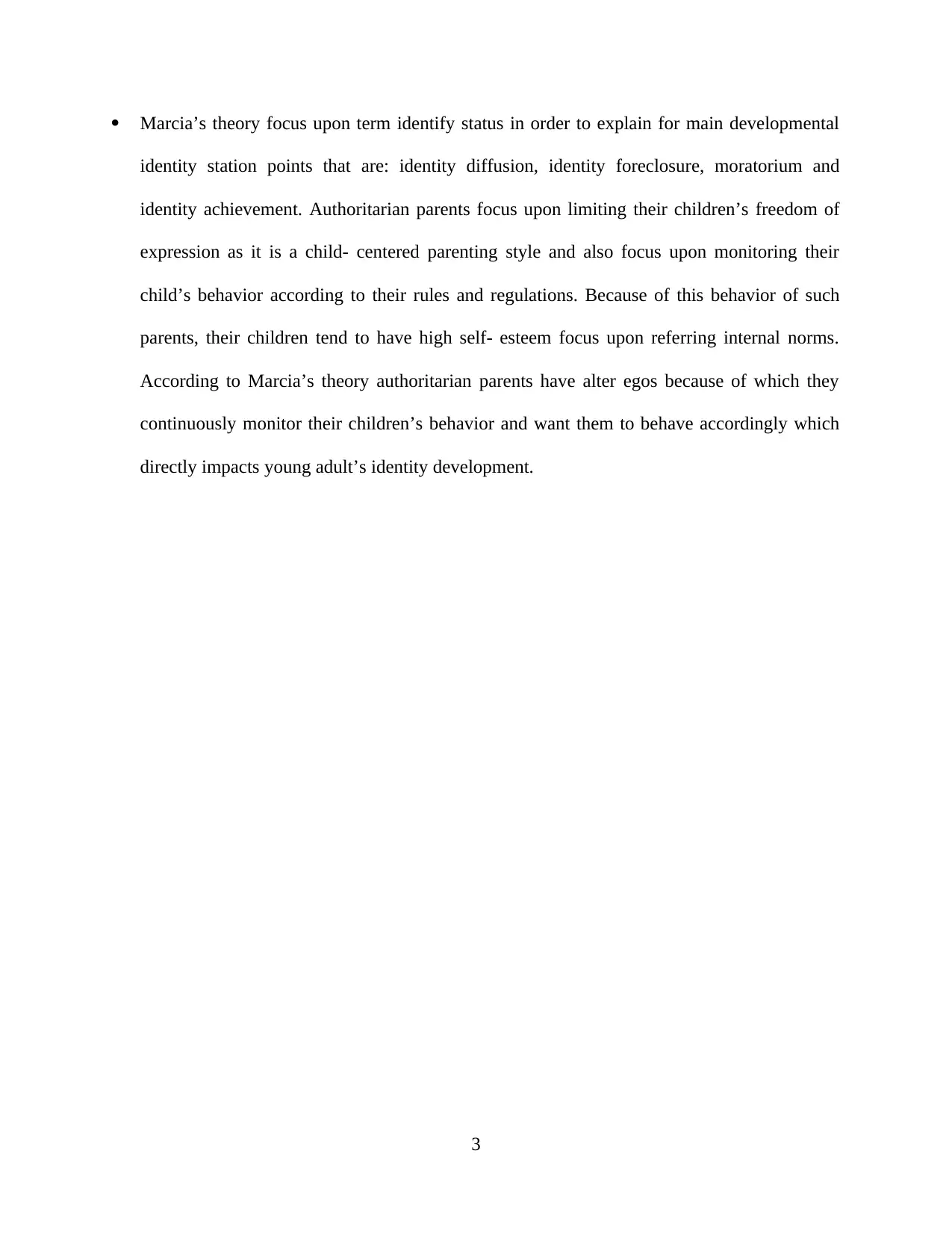
Marcia’s theory focus upon term identify status in order to explain for main developmental
identity station points that are: identity diffusion, identity foreclosure, moratorium and
identity achievement. Authoritarian parents focus upon limiting their children’s freedom of
expression as it is a child- centered parenting style and also focus upon monitoring their
child’s behavior according to their rules and regulations. Because of this behavior of such
parents, their children tend to have high self- esteem focus upon referring internal norms.
According to Marcia’s theory authoritarian parents have alter egos because of which they
continuously monitor their children’s behavior and want them to behave accordingly which
directly impacts young adult’s identity development.
3
identity station points that are: identity diffusion, identity foreclosure, moratorium and
identity achievement. Authoritarian parents focus upon limiting their children’s freedom of
expression as it is a child- centered parenting style and also focus upon monitoring their
child’s behavior according to their rules and regulations. Because of this behavior of such
parents, their children tend to have high self- esteem focus upon referring internal norms.
According to Marcia’s theory authoritarian parents have alter egos because of which they
continuously monitor their children’s behavior and want them to behave accordingly which
directly impacts young adult’s identity development.
3
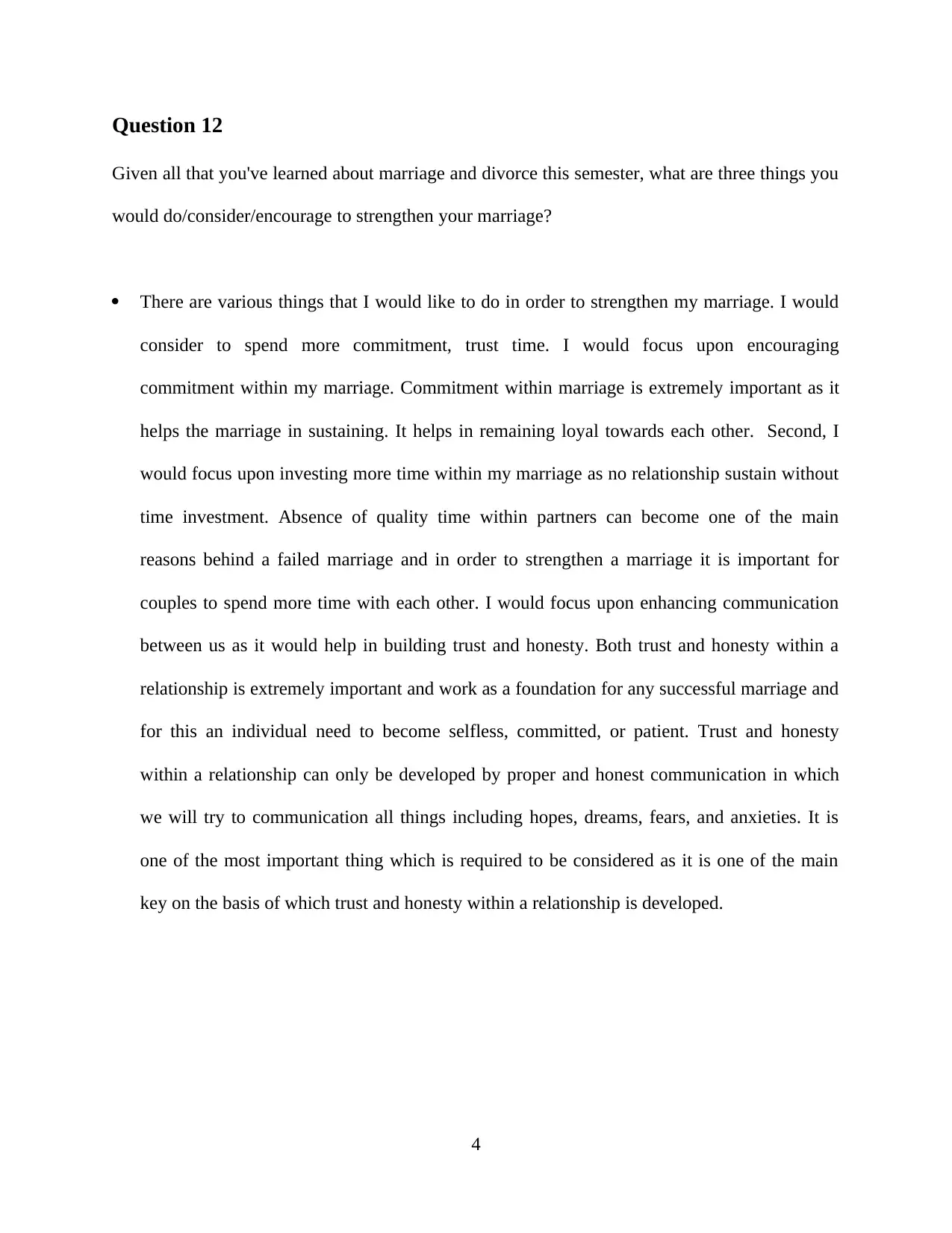
Question 12
Given all that you've learned about marriage and divorce this semester, what are three things you
would do/consider/encourage to strengthen your marriage?
There are various things that I would like to do in order to strengthen my marriage. I would
consider to spend more commitment, trust time. I would focus upon encouraging
commitment within my marriage. Commitment within marriage is extremely important as it
helps the marriage in sustaining. It helps in remaining loyal towards each other. Second, I
would focus upon investing more time within my marriage as no relationship sustain without
time investment. Absence of quality time within partners can become one of the main
reasons behind a failed marriage and in order to strengthen a marriage it is important for
couples to spend more time with each other. I would focus upon enhancing communication
between us as it would help in building trust and honesty. Both trust and honesty within a
relationship is extremely important and work as a foundation for any successful marriage and
for this an individual need to become selfless, committed, or patient. Trust and honesty
within a relationship can only be developed by proper and honest communication in which
we will try to communication all things including hopes, dreams, fears, and anxieties. It is
one of the most important thing which is required to be considered as it is one of the main
key on the basis of which trust and honesty within a relationship is developed.
4
Given all that you've learned about marriage and divorce this semester, what are three things you
would do/consider/encourage to strengthen your marriage?
There are various things that I would like to do in order to strengthen my marriage. I would
consider to spend more commitment, trust time. I would focus upon encouraging
commitment within my marriage. Commitment within marriage is extremely important as it
helps the marriage in sustaining. It helps in remaining loyal towards each other. Second, I
would focus upon investing more time within my marriage as no relationship sustain without
time investment. Absence of quality time within partners can become one of the main
reasons behind a failed marriage and in order to strengthen a marriage it is important for
couples to spend more time with each other. I would focus upon enhancing communication
between us as it would help in building trust and honesty. Both trust and honesty within a
relationship is extremely important and work as a foundation for any successful marriage and
for this an individual need to become selfless, committed, or patient. Trust and honesty
within a relationship can only be developed by proper and honest communication in which
we will try to communication all things including hopes, dreams, fears, and anxieties. It is
one of the most important thing which is required to be considered as it is one of the main
key on the basis of which trust and honesty within a relationship is developed.
4
⊘ This is a preview!⊘
Do you want full access?
Subscribe today to unlock all pages.

Trusted by 1+ million students worldwide
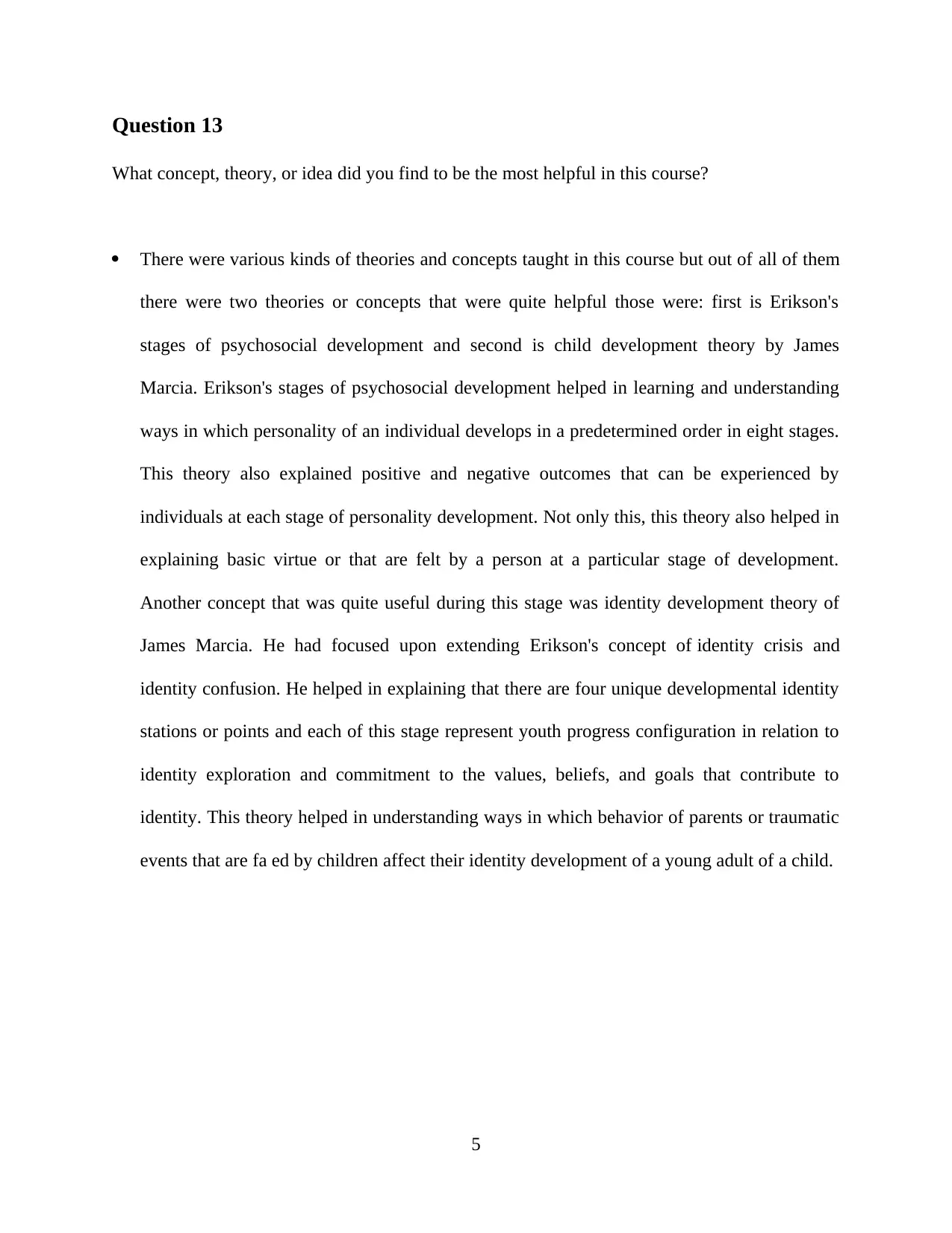
Question 13
What concept, theory, or idea did you find to be the most helpful in this course?
There were various kinds of theories and concepts taught in this course but out of all of them
there were two theories or concepts that were quite helpful those were: first is Erikson's
stages of psychosocial development and second is child development theory by James
Marcia. Erikson's stages of psychosocial development helped in learning and understanding
ways in which personality of an individual develops in a predetermined order in eight stages.
This theory also explained positive and negative outcomes that can be experienced by
individuals at each stage of personality development. Not only this, this theory also helped in
explaining basic virtue or that are felt by a person at a particular stage of development.
Another concept that was quite useful during this stage was identity development theory of
James Marcia. He had focused upon extending Erikson's concept of identity crisis and
identity confusion. He helped in explaining that there are four unique developmental identity
stations or points and each of this stage represent youth progress configuration in relation to
identity exploration and commitment to the values, beliefs, and goals that contribute to
identity. This theory helped in understanding ways in which behavior of parents or traumatic
events that are fa ed by children affect their identity development of a young adult of a child.
5
What concept, theory, or idea did you find to be the most helpful in this course?
There were various kinds of theories and concepts taught in this course but out of all of them
there were two theories or concepts that were quite helpful those were: first is Erikson's
stages of psychosocial development and second is child development theory by James
Marcia. Erikson's stages of psychosocial development helped in learning and understanding
ways in which personality of an individual develops in a predetermined order in eight stages.
This theory also explained positive and negative outcomes that can be experienced by
individuals at each stage of personality development. Not only this, this theory also helped in
explaining basic virtue or that are felt by a person at a particular stage of development.
Another concept that was quite useful during this stage was identity development theory of
James Marcia. He had focused upon extending Erikson's concept of identity crisis and
identity confusion. He helped in explaining that there are four unique developmental identity
stations or points and each of this stage represent youth progress configuration in relation to
identity exploration and commitment to the values, beliefs, and goals that contribute to
identity. This theory helped in understanding ways in which behavior of parents or traumatic
events that are fa ed by children affect their identity development of a young adult of a child.
5
1 out of 7
Related Documents
Your All-in-One AI-Powered Toolkit for Academic Success.
+13062052269
info@desklib.com
Available 24*7 on WhatsApp / Email
![[object Object]](/_next/static/media/star-bottom.7253800d.svg)
Unlock your academic potential
Copyright © 2020–2026 A2Z Services. All Rights Reserved. Developed and managed by ZUCOL.




